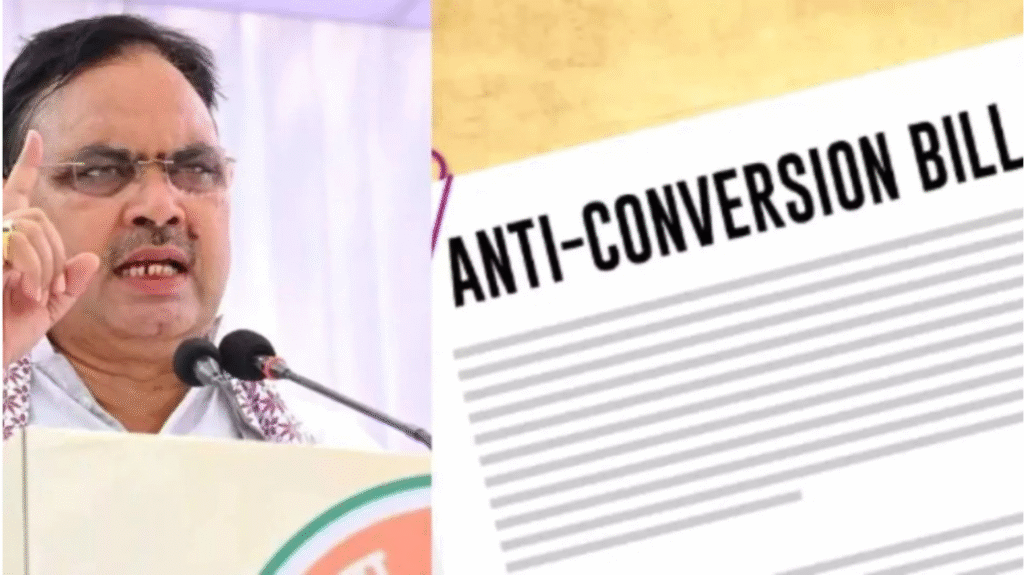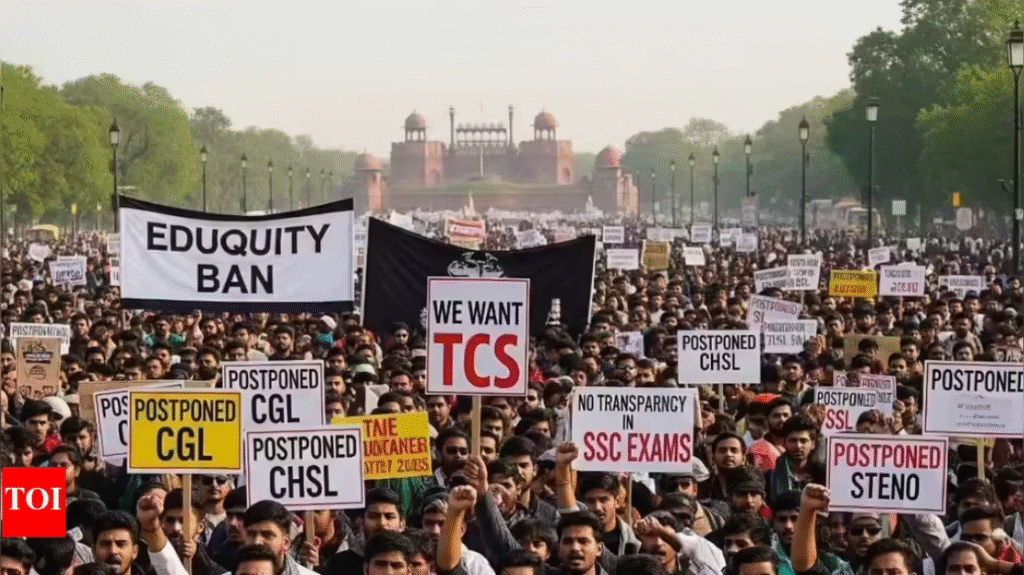On 9 September 2025, the Rajasthan Assembly passed the Prohibition of Unlawful Religious Conversion Bill, 2025, in a stormy session marked by protests and walkouts. The legislation aims to curb “fraudulent” and “forced” religious conversions through stringent provisions, making various conversion practices non-bailable and imposing severe penalties including life imprisonment for repeat offenders or mass conversion cases. The passage of this Bill makes Rajasthan the eighth Indian state to enact such laws.
Why This Bill Was Introduced & Its Background
- Previous attempts: Rajasthan had earlier introduced similar drafts in 2006 and 2008, but those did not receive assent.
- The stated rationale by the government: to prevent conversions by misrepresentation, coercion, force, allurement, fraud, or deception, including through marriage. Protect “vulnerable communities” like women, minors, SC/STs, persons with disabilities.
- Political context: The Bill has become part of the debate around “love jihad”, demographic balance, and social harmony in Rajasthan. Critics say the data does not support widespread instances of “forced conversion”; government counters it as preventive.
Key Provisions of the Rajasthan Bill
Prohibited Acts
The Bill prohibits conversion carried out via:
- Force, coercion, undue influence
- Misrepresentation or fraudulent means
- Allurement or promise of benefits
- Marriage (solely for the purpose of conversion)
Declaration & Procedure
- Individuals seeking voluntary conversion must provide a prior declaration to the District Magistrate (DM). The Bill requires advance notice (90 days as per new version) and a posting of the conversion intention.
- Failure to follow the procedure (notification, enquiry) leads to punitive consequences.
Who Can Lodge Complaints & Burden of Proof
- FIR may be filed by an aggrieved person, their relatives (blood, marriage, adoption), possibly any other person in some clauses.
- The burden of proof will shift to the accused (the one converting or facilitating conversion) to show conversion was not by prohibited means.
Penalties & Legal Consequences
The Bill introduces harsh sentences. Here are the key penalties:
| Type of Offence | Imprisonment Term | Minimum Fine | Additional Consequences |
|---|---|---|---|
| Conversion by fraud, force, allurement etc. | 7–14 years | ₹5 lakh | Non-bailable, cognizable offence |
| Conversions involving minors / women / SC / ST / disabled | 10–20 years | ≥ ₹10 lakh | More severe for vulnerable groups |
| Mass conversions | 20 years to life imprisonment | ≥ ₹25 lakh | Life sentence for repeat offences; property confiscation etc. |
| Receiving foreign / illegal funds for conversion | 10–20 years | ≥ ₹20 lakh | Enhanced scrutiny, regulatory oversight |
| Failure to notify district authorities / improper procedure | Jail + Fine (lower, but serious) | Varies (lakhs in some cases) | Offence could render the conversion invalid; penalties apply |
Other consequences include declaring marriages void if they were solely for conversion purpose, cancellation of licences of institutions engaged, confiscation or demolition of properties used for forced conversions.
Constitutional & Legal Issues
Fundamental Rights
- Article 25 of the Constitution grants freedom of conscience and the right to freely profess, practice, and propagate religion. Government has argued this does not include the right to convert another person by fraud, force, or coercion.
- Critics say several clauses may violate Article 25, right to marriage (Hindu Marriage Act etc.), equality (Article 14), and privacy.
Burden of Proof & Presumption
- Normal legal principle is “innocent until proven guilty”. The Bill shifts burden of proof onto accused in certain conversion cases. This reversal is controversial and may be challenged in courts as violating due process.
Administrative Powers & Impacts
- District Magistrates given strong roles for approving, enquiring, even cancelling conversions. If DM receives objections, public display etc. Some worry this gives over-broad administrative control into deeply personal religious choices.
Supporters’ Arguments vs Critics’ Concerns
Supporters say:
- Necessary to prevent fraudulent or forced conversion, protect vulnerable sections (women, minors, SC/ST, disabled).
- Helps maintain social harmony and prevent misuse of conversions with ulterior motives.
Critics warn:
- May infringe constitutional rights—freedom of religion, privacy, equality.
- Selective exemptions (e.g. reconversions to original religion or “ghar wapsi”) may create discriminatory treatment.
- Fear of misuse: ordinary interfaith relationships, personal faith changes might become criminalized. Loosely defined terms like “allurement”, “fraudulent means” can be misinterpreted.
Significance Going Forward
- This law sets a legal structure beyond older non-binding resolutions; it imposes criminal liability, mandatory reporting, and administrative oversight.
- Rajasthan joins other states with anti-conversion laws expanding in severity and scope.
- The Bill likely to be challenged in high courts or Supreme Court on constitutional grounds. Key test cases will include voluntariness, definition of coercion, freedom of religion vs state interest.
Conclusion
The Rajasthan Prohibition of Unlawful Religious Conversion Bill, 2025 represents a significant legislative shift — steep penalties, mandatory administrative process, non-bailable and cognisable offences, strong punishments for mass conversion and for involvement of vulnerable sections. While intended to protect people from coercive and fraudulent conversion practices, the Bill raises serious legal questions about individual rights, procedural fairness, and constitutional boundaries.
Proper implementation, safeguards against misuse, and judicial oversight will be crucial. As the Bill becomes law, its effects on religious liberty, interfaith marriages, and personal faith choices will be scrutinized. This is not just another state law — it may influence national jurisprudence and set precedents for how democracy and religious freedom interact with the law.
To read more Indian Laws and news, visit Legal Guide India



